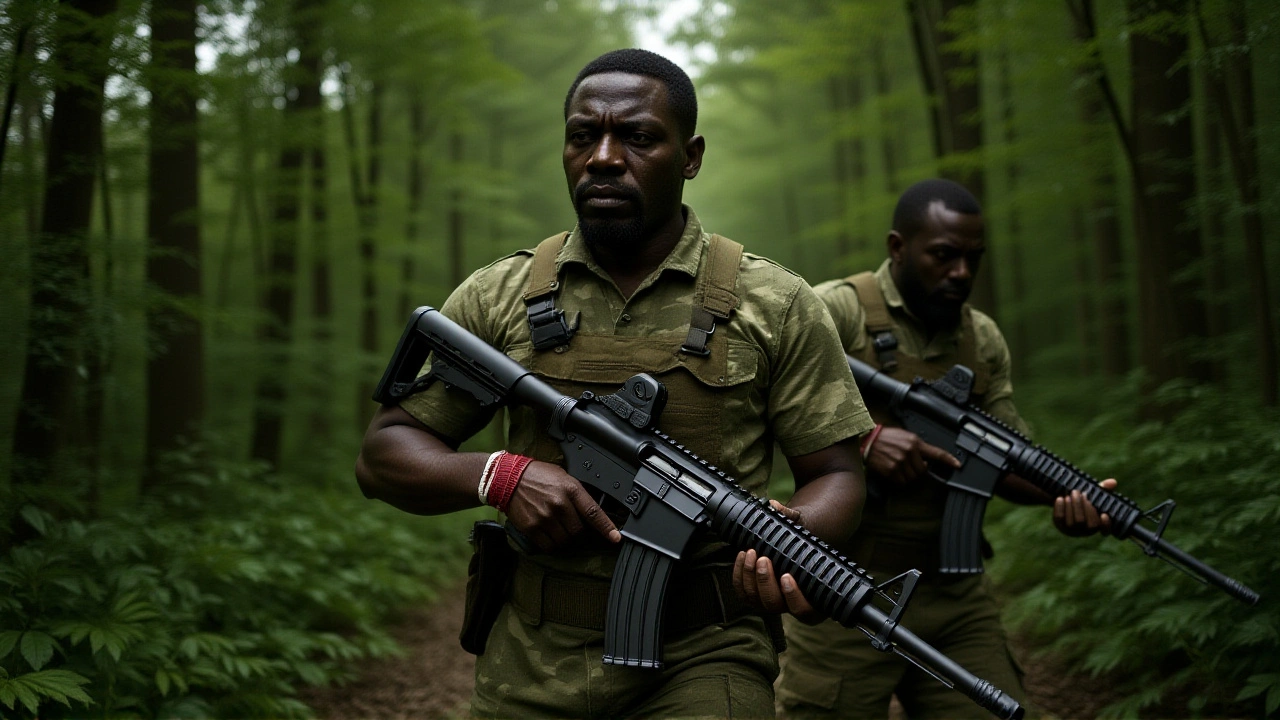On a quiet Tuesday evening in November, gunfire shattered the peace of a small church in Kwara State, Nigeria. Two worshippers lay dead. The pastor was gone. Dozens fled into the night, clutching children, leaving hymnals and prayer shawls behind. The attack, which occurred on November 18, 2025, was just one brutal chapter in a spiraling security crisis that has turned entire regions of Nigeria into battlegrounds. And it came exactly one day after armed men snatched 25 schoolgirls from a secondary school in Kebbi State, killing their vice-principal in the process. The link between the two? Not coincidence. It’s a pattern.
A Pattern of Terror
Firstpost’s video report, published on November 20, 2025, painted a chillingly ordinary scene before the horror: people singing, heads bowed, the scent of incense still lingering in the air. Then — gunfire. No warning. No demands. Just violence. Witnesses described people diving behind pews, mothers shielding toddlers with their bodies, the pastor being dragged out as others screamed. Police arrived too late. By then, the gunmen were gone — vanished into the bush, as they always do.
What makes this different from past attacks? The timing. The escalation. And the international spotlight.
In the first half of 2025 alone, Nigeria recorded 857 abductions — a number that doesn’t include the hundreds of killings, arson attacks, and village raids. The perpetrators? A tangled web of jihadist insurgents linked to Boko Haram splinters, profit-driven armed gangs, and ethnic militias exploiting weak state presence. Kwara and Kebbi — both in Nigeria’s northwest — have become hotspots. Not because of religion or politics alone, but because they’re poorly policed, under-resourced, and far from the capital’s gaze.
US Pressure Mounts
Here’s the twist: this violence is no longer just Nigeria’s problem. US officials have begun issuing blunt warnings. Not through diplomatic cables, but through public statements. State Department spokespersons, unnamed but credible, have told Nigerian counterparts that continued inaction could affect military aid, intelligence sharing, and even visa processing for Nigerian officials. The pressure isn’t new — Washington has long urged Abuja to clean up its security act — but now, it’s louder. And it’s tied to something bigger: the global perception of Nigeria as a failing state.
It’s not just about the church or the schoolgirls. It’s about oil. About migration. About the fear that Nigeria’s collapse could trigger a regional refugee crisis. The US has already suspended some counterterrorism training programs in the north. More could follow.
Nigeria’s Response: Too Little, Too Late?
Abuja’s reaction? Heightened security deployments. That’s it. No new strategy. No coordinated intelligence task force. No community outreach to root out informants. Military units were moved into Kwara and Kebbi — but they arrived days after the attacks. Local police, often underpaid and ill-equipped, were left to scramble. The same thing happened after the Kebbi school abduction. And the one before that. And the one before that.
“We’re not blind,” said a retired Nigerian army colonel who spoke on condition of anonymity. “But the political will? It’s buried under corruption, patronage, and the simple belief that if you ignore the north long enough, the world will forget.”
Meanwhile, families in both states are living in terror. Church services are canceled. Schools operate on erratic schedules. Parents don’t send kids to town alone. The economy is freezing. Small businesses shutter. Farmers won’t plant near roads.
The Human Cost
We don’t know the pastor’s name. We don’t know the names of the two dead. We don’t know how many of the schoolgirls are still alive. That’s the tragedy. In a country of over 200 million people, these victims become statistics — not stories. But behind each number is a mother who won’t sleep. A child who won’t speak. A community that no longer trusts the dark.
And yet, there’s resistance. In the days after the church attack, hundreds gathered in Abuja’s Unity Fountain, holding candles and photos of the missing. A woman held a sign: “They took our pastor. Will you take our silence?”

What Comes Next?
Three things will determine whether Nigeria can turn this around.
First: international pressure. The US is not alone. The UK, EU, and UN are watching. If aid is tied to measurable progress — not just troop movements — Abuja may finally be forced to act.
Second: local vigilance. In some villages, communities have formed armed patrols. They’re not soldiers, but they’re better than nothing. Their success depends on whether the government will arm and train them — or label them as criminals.
Third: political courage. Nigeria’s president must stop treating this as a police issue. It’s a national emergency. That means reforming the military, prosecuting corrupt officials who collude with gangs, and investing in education and jobs — not just bullets.
Without that, the next attack won’t be in Kwara. It’ll be in Lagos. In Port Harcourt. In the capital itself.
Background: The Roots of the Crisis
This isn’t new. Nigeria has struggled with violence since the early 2000s. Boko Haram’s rise in 2009, the 2014 Chibok schoolgirls kidnapping, the 2020 EndSARS protests — each revealed the same fault lines: weak governance, ethnic tension, and economic despair.
But this year, the violence has shifted. It’s less ideological. More opportunistic. Gangs now target churches and schools not for religious reasons, but because they’re soft, predictable, and profitable. Ransoms for pastors and students can reach $50,000 — more than a year’s salary for many Nigerian civil servants.
And the gangs? They’re not just locals. Intelligence reports suggest links to transnational criminal networks operating out of Niger and Chad. Some weapons are traced to Libya’s post-Gaddafi arms dumps. Others? Bought on the black market in Benin City.
The truth? Nigeria’s security apparatus is overstretched, underfunded, and riddled with leaks. Soldiers are paid late. Police lack radios. Commanders don’t know where their own units are.
When the church in Kwara was attacked, it took police 90 minutes to arrive. The gunmen were gone in 12.
Frequently Asked Questions
Why are churches being targeted in Nigeria?
Churches are targeted because they’re often in remote areas with little security, and worshippers gather predictably on Sundays and evenings. Many pastors are seen as community leaders with access to funds or influence, making them high-value kidnapping targets. Ransoms from churches can be higher than from schools, since congregations often mobilize quickly to pay. The attackers aren’t necessarily religious extremists — many are profit-driven gangs exploiting the lack of state presence.
How has the US responded to Nigeria’s security crisis?
The US has issued public warnings and privately pressured Nigerian officials, signaling that continued inaction could lead to reduced military aid and intelligence cooperation. While no formal sanctions have been imposed, the State Department has paused some counterterrorism training programs in northern Nigeria. The message is clear: Nigeria’s instability threatens regional security, and Washington is no longer willing to turn a blind eye.
What’s the connection between the Kwara church attack and the Kebbi school abduction?
They’re part of the same escalating pattern: soft targets, minimal security, and coordinated timing to maximize media impact. Both occurred within 24 hours in neighboring states, suggesting either a shared network of gangs or a deliberate strategy to overwhelm Nigerian authorities. The 857 abductions in the first half of 2025 show this isn’t random — it’s systemic.
Are the attackers linked to Boko Haram or ISIS?
Some may be splinter groups from Boko Haram, but many are now independent criminal gangs with no ideological ties. Forensic analysis of weapons and communication patterns shows most operate for profit, not religion. While ISIS-West Africa still exists, its influence has waned. Today’s kidnappers are more likely to be former soldiers, unemployed youths, or even local farmers turned bandits — drawn by the money and the lack of consequences.
Why haven’t Nigerian forces stopped these attacks?
Nigeria’s security forces are stretched thin across 36 states, underfunded, and plagued by corruption. Soldiers often go unpaid for months. Equipment is outdated. Command structures are chaotic. In rural areas like Kwara and Kebbi, police stations lack vehicles, radios, or even basic ammunition. Without reliable intelligence and community cooperation, raids are reactive — not preventive.
What can ordinary Nigerians do to help?
Community vigilance is critical. In villages where residents share information with authorities and form neighborhood watch groups, attacks have dropped. Citizens can also demand accountability from elected officials, support NGOs working on security reform, and refuse to pay ransoms — which only fuels the cycle. Peaceful protests and social media campaigns have already pressured the government before — they can again.


Vikash Kumar
This is what happens when you let corruption rot the system. No one cares until the US starts threatening aid. Pathetic.
Siddharth Gupta
I mean... it's wild how fast things spiral when the lights go out in the north. People just want to pray, go to school, plant crops. But the chaos? It’s like a storm no one bothered to build a roof for. 😔
Anoop Singh
You guys keep blaming the government but have you seen how many pastors are rich? Like, they drive SUVs and preach poverty. Of course they get targeted. It’s not about religion - it’s about money. Duh.
Omkar Salunkhe
US pressure?? lmao they’ve been ignoring this for 20 years now. And now they care because of oil? Please. Also the article says 'Kwara' but the map shows Kebbi... typo much?
raja kumar
The silence of the world is louder than the gunfire. We don't need slogans. We need systems. Not more soldiers. More teachers. More justice. More dignity. This isn't just Nigeria's problem. It's humanity's failure.
Sumit Prakash Gupta
The operational tempo is off the charts. We're seeing a non-linear escalation in asymmetric threat vectors - soft targets, low-cost high-impact ops. The state's COIN strategy is stuck in 2012. Need integrated intel fusion, real-time biometric tracking, and community-based HUMINT networks.
Shikhar Narwal
I just saw a video of kids in Kebbi drawing their teachers with hearts. 🫶 We can't let them become just another headline. Let’s do something. Even a share helps.
Ravish Sharma
Oh wow, the US is finally awake? Took them long enough. Nigeria’s elite probably thought they could keep looting while the north burned. Newsflash: the world isn’t dumb. And neither are the mothers holding photos of their missing kids.
jay mehta
I know it feels hopeless... but look at the candlelight vigils! People are rising! 💪 Let’s not give up! Every voice matters - DM your rep, post a story, donate to a local org! WE CAN DO THIS! 🙌❤️
Amit Rana
The real solution isn't more troops. It's rebuilding trust. Local elders need to be part of the security council. Teachers need pay. Farmers need roads. Police need training, not just uniforms. This isn't a military problem - it's a social contract that broke. Fix the roots, not just the symptoms.